The Covid-19 pandemic nearly stopped the PetroBowl event from happening during this unprecedented time, but innovation created an opportunity to continue the competition virtually. Although we expect that the face-to-face competition will bounce back, this year’s conditions forced us to explore competition-from-home options, relying heavily on video conferencing. Due to the nature of the competition, we saw the need to develop a technological solution to enable teamwork while students are separated staying safe at home.
In a fast response to this emerging situation, Universidad del Zulia forged ahead with a software solution to meet the requirements of a virtual PetroBowl Latin America and Caribbean Virtual Regional Qualifier Competition 2020. The Virtual Option (remote teams with players in individual locations) fulfilled the spirit of the competition, while covering and emulating key competition aspects:
- SPE student chapter teams compete against each other in a series of quick-fire rounds of games
- Participants hone their ability to answer the specific type of oil and gas industry questions as quickly as possible
- Standard single elimination bracket-style process in which two teams compete and the winning team advances to the next round
Developers used the .NET framework to create the PetroBowl Windows desktop and server-based application and .NET Core to create the server applications. Each game uses toss-up questions read aloud by the software in audio format. The questions are randomly selected, assigning a weight for each of the eight primary SPE disciplines from a pre-screened question bank. Each player has the same set of questions during their match and play individually; the first player from each team that clicks on “Answer” is the player whose answer is evaluated. The software records the time taken individually to answer each question and during evaluation session with judges, the fastest question from each team will be assessed and evaluated to determine final Team Score through the Judges’ Module.
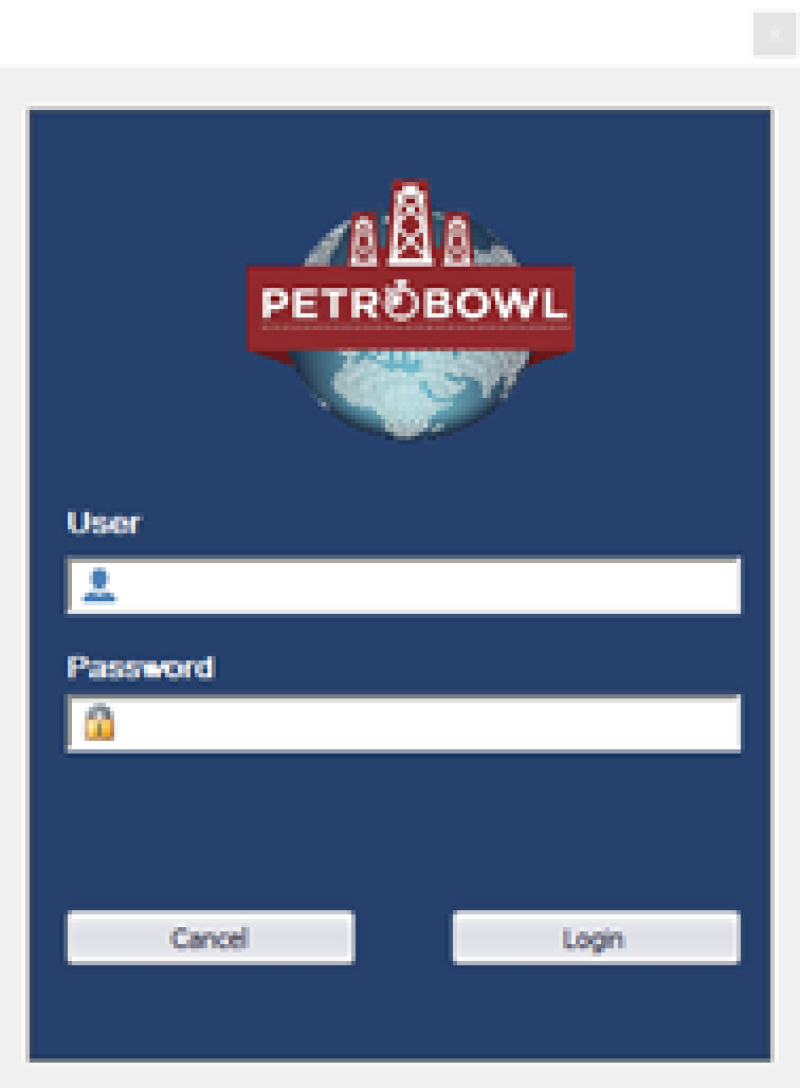
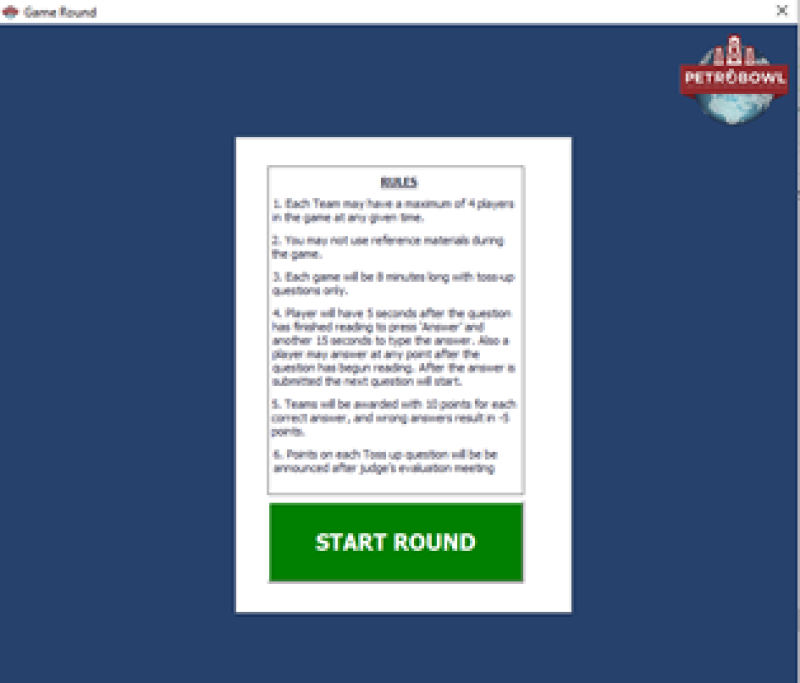
PetroBowl software login window and game module.
Your software is really good, and very close to reality, you did an amazing job! It was our pleasure to work with you guys, and we really appreciate you have taken us into consideration for this testing. I think you all have done an excellent job in this software.
Another innovative aspect is the virtual avatar image created with Bitmoji App. Players, judges, and volunteers created their own personal emoji, an expressive cartoon avatar, featuring themselves and their personalities. Latin America and Caribbean Communications Committee Leader encouraged students to have an online self just for the virtual competition, an avatar to participate in this new digital reality, and the virtual characters become virtual identities.
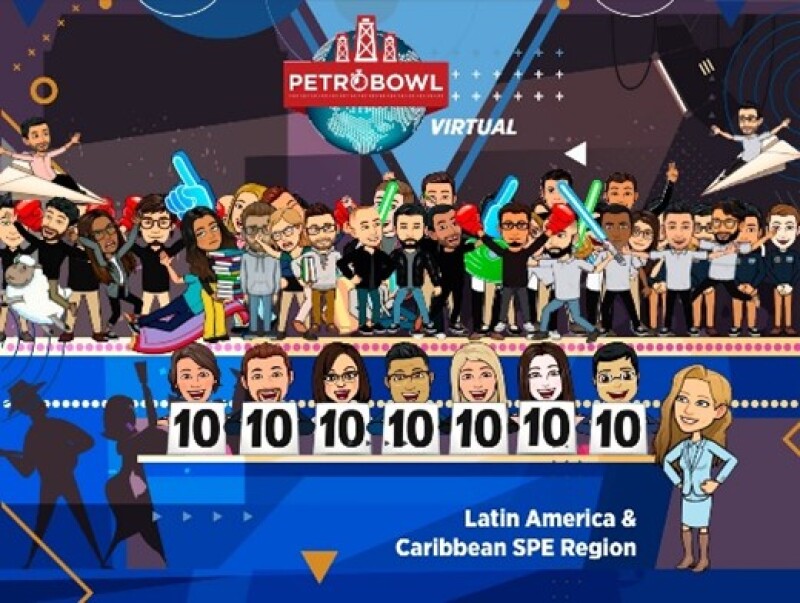
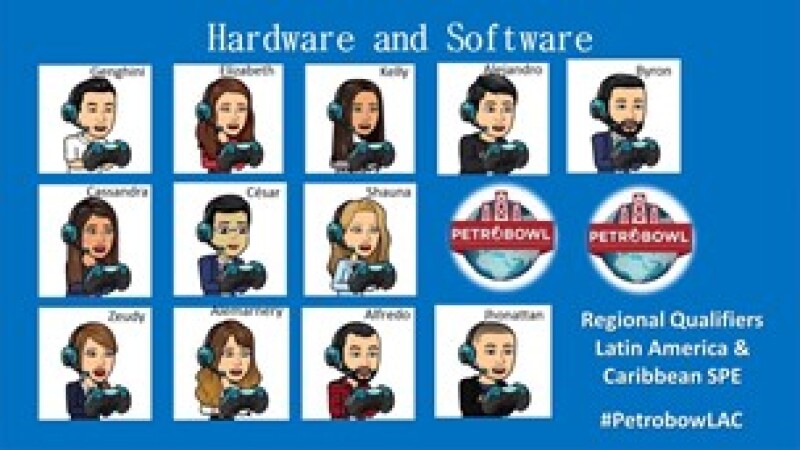
Players, judges, and volunteers avatars from the Latin America and Caribbean region virtual PetroBowl contest.
PetroBowl virtual contest requires students to have a laptop or computer to install the Windows desktop application, stable internet connection, and functionality for video conferencing, i.e., camera, speakers, and microphone. Communication between team players during the match is forbidden, but the nature of the virtual competition where all play simultaneously makes it difficult.
The system’s auditing features allow detailed match traceability providing a record of correctly and incorrectly answered questions by each team and by every player. Statistics about individual or team overall performance or by discipline can be generated accessing competition records. This feature provides a useful self-evaluation tool for performance improvement for future competitions.
Thank you to all the organizers. I think I speak for my team when I say we had a great experience and were very pleasantly surprised at how well the software works. Although it does perhaps take away the excitement of buzzing in during live games, we really appreciate your efforts during this troublesome period. We wish you all the best for the future tournaments and hopefully see you again soon!
Following the successful virtual Latin America & Caribbean PetroBowl Competition with 18 student chapters, 9 countries, and 83 students, the software was also used globally to host the first ever Virtual PetroBowl Championship with 147 Students from 30 student chapters in 18 countries.
The PetroBowl Championship is managed on behalf of the SPE Board by the Young Member Engagement Committee (YMEC). Five teams are selected per year to participate in the PetroBowl Championship from six PetroBowl super-regions, which include Africa, Asia Pacific, Europe and Russia, Latin America and Caribbean, Middle East, and North America.
YMEC implemented the 2020 Virtual PetroBowl Competition for students globally with SPE volunteers from all over the world by structuring four work committees— Planning, Communications, Questions, and Software—and hosted the championship using the PetroBowl software. Oklahoma University won the 2020 PetroBowl Championship, and University Teknologi Petronas and Universidade Federal do Rio de Janeiro were the first and second runner ups.
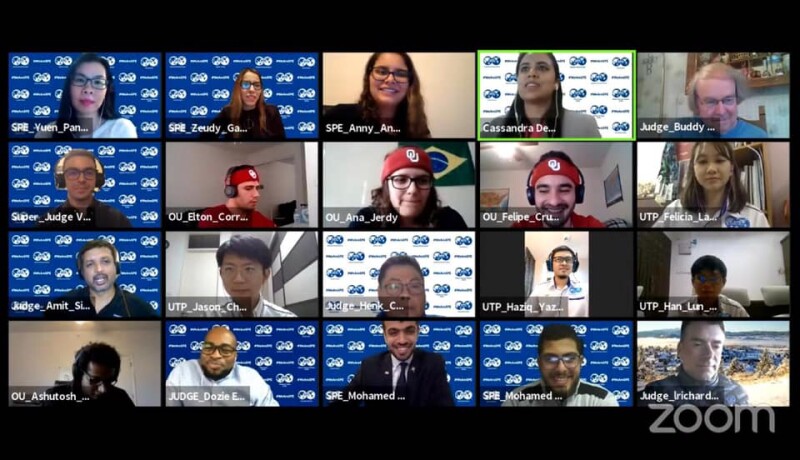
Students participating in the 2020 Virtual PetroBowl Championship.
As the 2021 Covid-19 era continues, the 2021 PetroBowl national and regional qualifier competitions are being hosted virtually. With support from North America, Europe, and Latin America and Caribbean SPE regions, Universidad del Zulia is delivering the PetroBowl Software for the 2021 regional and national qualifiers.
I’m with the Santiago Lencinas from Instituto Tecnológico de Buenos Aires’ PetroBowl Team. We participated in the last regional championship, which was placed virtually due to the context. The virtual competition has some advantages like playing alone and comfortable in your home. Also, the software is very simple and easy to understand/play. On the other hand, the most difficult part is playing without seeing your teammates. I fully recommend dividing themes within the players and trust them to not overlap answers and take advantage of the time.
Acknowledgements
Software Development Team: Zeudy Galbán, Jonathan Ávila, Alfredo Rodríguez, and Alemarnery Villalobos.
Latin America and Caribbean Regional Qualifiers PetroBowl Committee leads: Cesar Patiño, Cassandra Dewan, William Genghini Galvis Pineda, Filipe Duarte, Zeudy Galbán.
PetroBowl Championship 2020 Committee leads: James Whitaker, Yuen Pang, Rodrigo Terraza Ruedas, Cassandra Dewan, Filipe Duarte, Cesar Patiño, and Zeudy Galbán.
[The article was sourced from the author by TWA Managing Editor Andreas Michael.]


